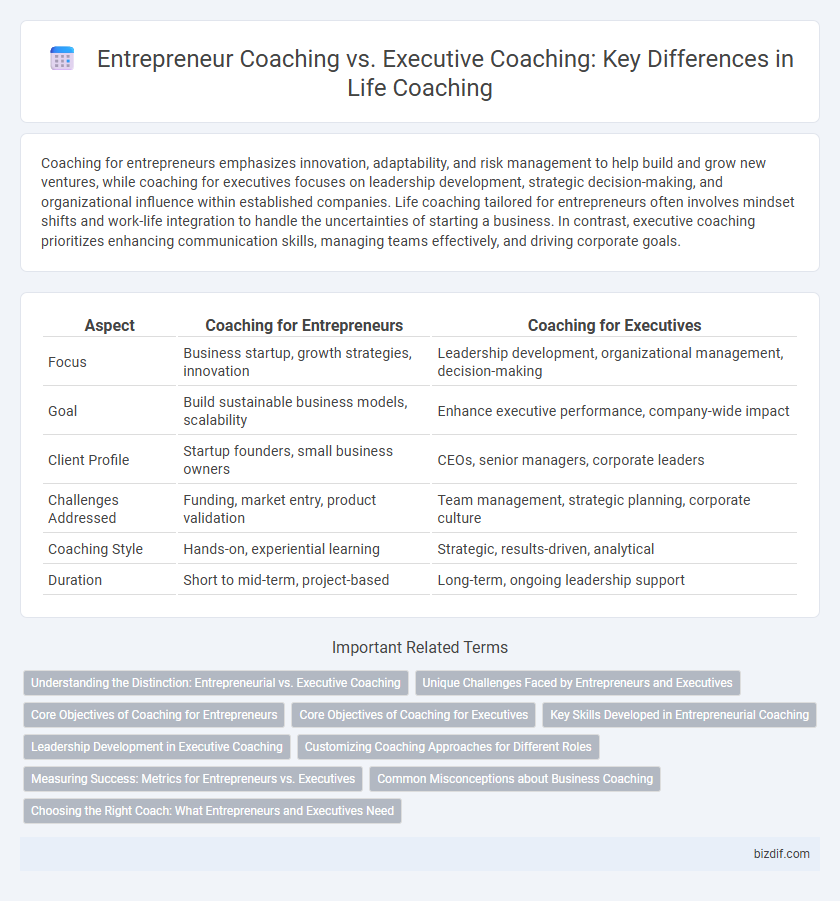Coaching for entrepreneurs emphasizes innovation, adaptability, and risk management to help build and grow new ventures, while coaching for executives focuses on leadership development, strategic decision-making, and organizational influence within established companies. Life coaching tailored for entrepreneurs often involves mindset shifts and work-life integration to handle the uncertainties of starting a business. In contrast, executive coaching prioritizes enhancing communication skills, managing teams effectively, and driving corporate goals.
Table of Comparison
| Aspect | Coaching for Entrepreneurs | Coaching for Executives |
|---|---|---|
| Focus | Business startup, growth strategies, innovation | Leadership development, organizational management, decision-making |
| Goal | Build sustainable business models, scalability | Enhance executive performance, company-wide impact |
| Client Profile | Startup founders, small business owners | CEOs, senior managers, corporate leaders |
| Challenges Addressed | Funding, market entry, product validation | Team management, strategic planning, corporate culture |
| Coaching Style | Hands-on, experiential learning | Strategic, results-driven, analytical |
| Duration | Short to mid-term, project-based | Long-term, ongoing leadership support |
Understanding the Distinction: Entrepreneurial vs. Executive Coaching
Entrepreneurial coaching emphasizes innovation, risk management, and scalability, helping entrepreneurs navigate startup challenges and growth strategies. Executive coaching focuses on leadership development, organizational influence, and operational efficiency to enhance corporate performance. Recognizing these distinctions allows tailored coaching approaches that align with specific professional goals and environments.
Unique Challenges Faced by Entrepreneurs and Executives
Entrepreneurs often face the challenge of managing uncertainty, securing funding, and balancing multiple roles, requiring coaching focused on innovation, risk-taking, and resilience. Executives encounter complex organizational dynamics, strategic decision-making, and stakeholder management, necessitating coaching that enhances leadership skills, emotional intelligence, and influence. Tailored coaching approaches address these distinct needs to optimize performance and growth for both groups.
Core Objectives of Coaching for Entrepreneurs
Coaching for entrepreneurs centers on cultivating innovation, risk management, and scalable business strategies to drive startup growth and market disruption. Core objectives include enhancing leadership agility, improving decision-making under uncertainty, and fostering resilience against financial and operational challenges. Entrepreneurial coaching emphasizes proactive opportunity identification and adaptive problem-solving tailored to dynamic, high-growth environments.
Core Objectives of Coaching for Executives
Coaching for executives prioritizes enhancing leadership capabilities, strategic decision-making, and organizational influence to drive business growth and innovation. It focuses on developing emotional intelligence, conflict resolution skills, and executive presence to effectively manage teams and stakeholders. Unlike entrepreneurial coaching, which emphasizes startup scalability and risk-taking, executive coaching centers on optimizing existing corporate roles and sustaining long-term performance.
Key Skills Developed in Entrepreneurial Coaching
Entrepreneurial coaching emphasizes developing skills such as innovation management, risk assessment, and strategic agility, which are crucial for navigating startup challenges and market uncertainties. It fosters resilience, opportunity recognition, and decision-making under ambiguity to drive business growth and scalability. Unlike executive coaching, which prioritizes leadership optimization and organizational influence, entrepreneurial coaching targets rapid problem-solving and resourcefulness essential for new venture success.
Leadership Development in Executive Coaching
Executive coaching centers on enhancing leadership development through personalized strategies that improve decision-making, emotional intelligence, and organizational influence. Coaching for entrepreneurs emphasizes innovative problem-solving, risk management, and agility to drive business growth and startup success. Both approaches target leadership skills but cater to distinct challenges faced by executives within established companies and entrepreneurs navigating emerging ventures.
Customizing Coaching Approaches for Different Roles
Coaching for entrepreneurs requires a focus on innovation, risk management, and scaling strategies, while executive coaching emphasizes leadership development, organizational alignment, and decision-making skills. Tailoring coaching approaches involves assessing the unique challenges and goals of each role to deliver targeted support and measurable outcomes. Customized coaching frameworks improve performance by addressing specific mindsets and operational contexts relevant to entrepreneurs and executives.
Measuring Success: Metrics for Entrepreneurs vs. Executives
Measuring success in coaching for entrepreneurs often centers on business growth indicators such as revenue increase, customer acquisition, and innovation milestones. In contrast, executive coaching success is evaluated through leadership effectiveness, employee engagement scores, and strategic goal achievement. Tailoring metrics to these distinct roles ensures focused development aligned with their unique challenges and objectives.
Common Misconceptions about Business Coaching
Business coaching is often misunderstood as a one-size-fits-all service, but coaching for entrepreneurs typically emphasizes innovation, risk management, and scaling strategies, while coaching for executives focuses on leadership development, organizational alignment, and decision-making skills. Many believe business coaching guarantees quick financial success, yet it primarily fosters mindset shifts, resilience, and strategic clarity tailored to the client's unique business context. Effective coaching requires recognizing these distinct objectives to address the specific challenges entrepreneurs and executives face in their professional growth.
Choosing the Right Coach: What Entrepreneurs and Executives Need
Choosing the right coach hinges on understanding distinct needs: entrepreneurs require guidance in innovation, risk management, and scaling business models, while executives seek leadership development, strategic decision-making, and organizational influence enhancement. Effective coaching for entrepreneurs incorporates agile methodologies and startup ecosystem insights, whereas executive coaching emphasizes emotional intelligence, corporate governance, and stakeholder communication. Tailored coaching strategies optimize goal achievement by addressing these unique professional challenges and environments.
Coaching for entrepreneurs vs coaching for executives Infographic

 bizdif.com
bizdif.com